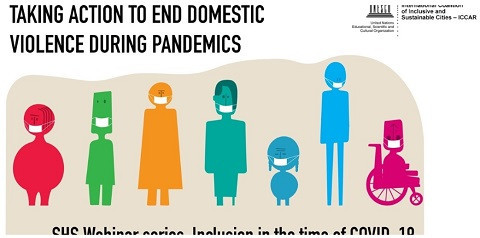
GCED Basic Search Form
Quick Search
You are here
News

Pandemics have different impacts on women and men, girls and boys and non-binary people, among different socio-economic classes and age groups. Violence, harassment and oppression against women and girls during every type of emergency tend to increase.
In view of the current situation, UNESCO organized an online conference entitled “Taking action to end domestic violence during pandemics” on 19 May 2020, which gathered global leaders and experts from national authorities, civil society organizations and the Multilateral system.
Ms Saniye Gülser Corat, UNESCO’s Director for Gender Equality, opened the debate presenting the existing data on domestic violence which appears to be “scarce, yet worrisome”. Several reports suggest that there is an increase of up to 35% in domestic violence as a result of confinement measures to prevent the spread of the disease. Due to the difficulty in asking for help in the current circumstances, the magnitude of the phenomenon could be even greater.
Ms Corat recalled that domestic violence is not only a women’s issue. A holistic approach to gender equality is vital to ensure a safe and empowered future for all women and girls. UNESCO was indeed among the first UN agencies to envisage a strong participation of men and boys in this field, since an expert group meeting was convened on this matter by the Organization in 1997 in Oslo, Norway. At UNESCO, we also consider the specific issues affecting the LGBTI population with regards to different forms of violence.
Ms Corat introduced the other speakers and passed the floor to H.E. Ms Elena Bonetti, Minister for Equal Opportunities and Family of the Republic of Italy, who shared some actions that the Government of Italy has been taking to ensure women’s safety during and after this new pandemic that has seriously affected the country. COVID-19 has not only impacted the world’s health and economic systems but has also shifted life paradigms. According to the Minister, it is time to implement actions aimed at ensuring that women become key actors of this new paradigm where gender equality is the main pillar. To do so, it is vital that they have the necessary skills to be involved in the work force at all levels, including in leadership and decision-making positions.
Through targeted campaigns, the Minister implemented specific measures to make sure that women know how and where to they seek help if they feel unsafe at their place. One of such campaigns is named “Libera puoi” (a free woman can), and it is aimed at providing women with financial stability so that they have the means to escape from violent homes.
Nine years ago, in May 2011, the Council of Europe was opening for signature the Convention on preventing and combating violence against women and domestic violence, better known as the Istanbul Convention, a landmark for human rights. Ms Snežana Samardžić-Marković, Director General of Democracy at the Council of Europe, was a speaker at the online conference too. During her intervention, she shed light on new concerns this pandemic has brought in relation to domestic violence and other forms of violence against women and girls, such as the exposure to control of the perpetrators, women’s further isolation from face to face support, as well as disruptions of existing support services.
Some examples of the actions taken by the governing bodies of the Convention include a statement by GREVIO to uphold the Parties’ standards during the COVID-19 pandemic, and a declaration by the Committee of the Parties asking countries to support and protect survivors from further acts of violence by ensuring the function of support services and access to information. Ms Samardžić-Marković also called on stakeholders to pay special attention to groups that are exposed to greater risk, such as migrant women, women with disabilities, sex workers, elderly women and women from minority groups. Asylum seeking women should be provided with access to information and resources, as support services for women without resident permit is extremely limited in some countries.
Following her presentation, Mr Humberto Carolo, Executive Director of the White Ribbon (Canada) shared with the participants a different perspective: how men and boys can become allies in eliminating gender-based violence. By playing a dominant role at home, men too often have control over family lives. Violent behaviors are on the rise during economic crises, especially when jobs are lost.
Changing men’s mindsets is vital to address this situation. Using social marketing campaigns could be an effective means to present healthy and non-violent ways that men can use to address personal issues. Mr Carolo further explained how the entire community, starting from neighbors and family members, can play an important role in preventing violence against women and girls. Mr Carolo called upon men to speak up against all forms of gender-based violence, and to be strong allies in the fight against domestic violence which is one of its worst forms.
Ms Ângela Melo, Director, SHS Policies and Programmes at UNESCO gave some concluding remarks. She thanked the speakers and highlighted the importance of extending international efforts to uphold basic human rights and of collecting sex-disaggregated data to better understand this phenomenon. She further recalled that this conference was part of a series of dialogues organized by the Social and Human Sciences sector titled “Inclusion in the time of COVID-19”.
A lively debate took place between the speakers and around 150 people that attended the online meeting.
URL:
https://en.unesco.org/news/taking-action-end-domestic-violence-during-pandemics
